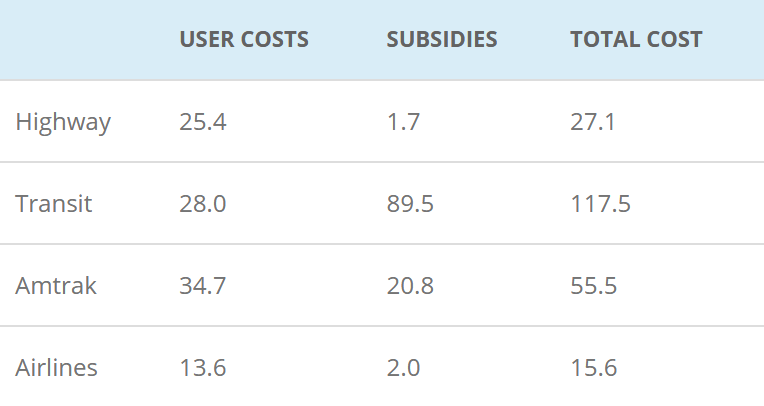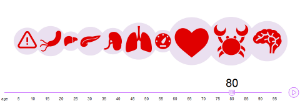How far can you travel for $10?
Notes
Think transit is cheap? Think again! $10 will get you four times further in your car than on transit
I know what you’re thinking… $10 will only get you 9 miles on the bus or the subway? that doesn’t seem right!
The reason it seems wrong is that you only need to pull $2.38 out of your wallet to travel those 9 miles; the rest will be covered by government subsidies. The only thing is, if you’re a taxpayer, you’re paying for that generous $7.62 subsidy. Whichever way you slice it, you’re paying $10 to travel just 9 miles.
Long distance rail’s a bit better value. On Amtrak, your $10 will get you 18 miles. Because it’s a bit more efficient, the government subsidy is a bit less, only $3.75. Regardless, for your $10, you’ll travel twice as far.
If you really want to go places, though, you’d be better off jumping in your car. Now your $10 will take you 37 miles! Though the government does subsidize the highways, it’s only to the tune of 63¢, requiring you to pay a full $9.37. But who cares, you’re going four times further for your money than on transit, and a whole lot faster, too.
Air travel will take you a full 64 miles for your $10. The comparison here is a little unfair, given that you’re going to have to get to the airport by road or rail. (I did try walking to an airport once, but it turns out that the security people really don’t like you to do that.) But if we’re going to take getting to the airport, train station or bus stop into account, then your car makes even more sense as a means of transport, given that it’s parked right outside your house, whereas the bus stop may be several blocks away and the train station may be 300 miles away. (Seriously, the nearest passenger train station to where I live in Canada is nearly 300 miles away.)
The fatal flaws of transit are exposed in a new paper Charting Public Transit’s Decline by Randal O’Toole, Senior Fellow at the Cato Institute.
It’s significant, I think, that the more inefficient the means of transport, the more the government subsidizes it. They have to: transit and long distance rail are so inefficient as a way of moving people that no one would use them if the government didn’t cover a significant proportion of the costs. The most efficient door-to-door means of transport, the car, is barely subsidized at all. Why?
In his book Romance of the Rails: Why the Passenger Trains We Love Are Not the Transportation We Need, Randal O’Toole argues that streetcars, subways and railroads are technologies of the past, as obsolete as stagecoaches and steamships, long since superceded by highway and air travel. We keep these old technologies around for the same reason we keep typewriters and fountain pens around: they’re a romantic reminder of the past.
I’m as romantic as the next guy. I like streetcars. I like trains. I have several fountain pens and still use them to write letters to friends. The difference is, my fountain pens don’t cost me very much, and I don’t demand massive government subsidies to keep them running.
Subscribe now and I’ll let you know whenever I create a new visualization
It’ll only be every couple of months or so, I won’t let anyone else have your email address, and you can unsubscribe at any time
Thanks for subscribing!
Check your inbox for an email to confirm your subscription
Oh no, something went wrong, and I was unable to subscribe you!
Please refresh your browser and try again
Podcasts
Free Thoughts – A weekly podcast from Libertarianism.org providing a much-needed counterpoint to the presumption by mainstream political parties that the more power they have over us – the more planning, the more regulation, the more spending – the better.
This things made thinkable visualization was inspired by Episode 264 – Derailed: The False Promises of Trains, Subways, and Light Rail – with Randal O’Toole.
If a podcast is listed on things made thinkable, it means I listen to it regularly and can recommend it as a thought-provoking follow-up to this visualization
Sources
The Antiplanner – Calculating Transportation Subsidies

2016 Costs in Cents per Passenger Mile
Date
First published 12 November 2018











Comments
Click here to leave a comment
Thanks for your comment!
I’ll check it and put it live as soon as I can
Oh no, something went wrong, and I was unable to post your comment!
Please refresh your browser and try again
Joshua ⋅ 3 January 2019
Adding Uber / Lyft or Bird(scooter) to mix will make things more interesting since these are alternate transportation ideas
Mark Jeffery ⋅ 3 January 2019
I love that idea, thanks Joshua! I'll take a look into it!